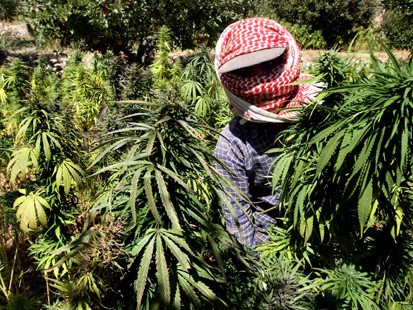
 Ali plucks a sprig of the cannabis sativa plant and sniffs its distinctive leaves with appreciation. This Lebanese farmer's field of marijuana, a splash of bright green on the sun-baked plains of eastern Lebanon's Bekaa Valley, will yield around 33 pounds of cannabis resin, or hashish, which he will sell for about $10,000, many times more than he could hope to earn from legitimate crops and for almost no work at all.
Ali plucks a sprig of the cannabis sativa plant and sniffs its distinctive leaves with appreciation. This Lebanese farmer's field of marijuana, a splash of bright green on the sun-baked plains of eastern Lebanon's Bekaa Valley, will yield around 33 pounds of cannabis resin, or hashish, which he will sell for about $10,000, many times more than he could hope to earn from legitimate crops and for almost no work at all. "All I have to do is throw the seeds on the ground, add a little water, and that's it," says Ali, who spoke on the condition that his full name was not used. "I would be crazy not to grow [marijuana]."
It has been a bumper year for marijuana cultivation in the Bekaa Valley, the largest, growers say, since the "golden years" of Lebanon's 1975-1990 civil war, when marijuana and heroin grown and processed here flooded the markets of Europe and the United States.
Hashish production is illegal in Lebanon, and each year since the early 1990s police backed by troops bulldoze the crops before they can be harvested, leaving farmers penniless. But the failure of United Nations and government programs to encourage the growth of legitimate crops, coupled with months of political crisis, deteriorating economic prospects, and a frail security climate have encouraged farmers to return to large-scale marijuana cultivation.
"The worse the security situation is in Lebanon, the more we can grow," says Ali.
Worth the Risk, Farmers Say
Despite the threat of police raids destroying their crops, farmers say the financial returns justify the risk. This year they were lucky, however. The Army was unable to spare troops to provide security for the police raids because of the raging battle during the summer growing season against Islamist militants in a Palestinian refugee camp in northern Lebanon. Furthermore, the heavily armed local farmers made it clear to the police that they would resist attempts to wipe out their marijuana crops.
"We told the police that for every [marijuana] plant they cut down, we would kill one policeman," says Ibtissam, the wife of a marijuana farmer in the village of Taraya.







